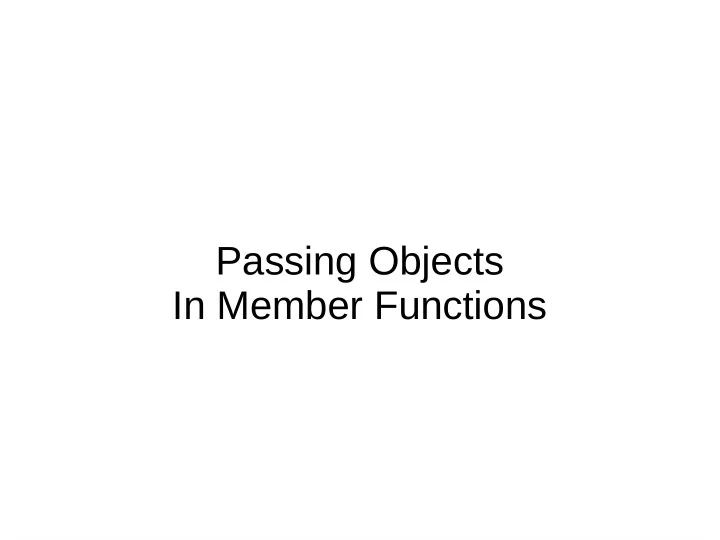

Passing Objects In Member Functions
Object Parameter class Bank { ... int Withdraw(int id, const Money &money); int Deposit(int id, const Money &money); ... }; ● Why pass the object by reference?
Object Parameter class Bank { ... int Withdraw(int id, const Money &money); int Deposit(int id, const Money &money); ... }; ● Why pass the object by reference? – Objects can potentially be very large and hold lots of different member variables – Passing by value invokes a constructor / destructor to copy each of the variables – This is especially taxing when dynamically allocating memory
Object Return class Bank { ... Money AccountBalance(int id) const; //(1) Account* AccountData(int id) const; //(2) Account& AccountData(int id) const; //(3) not used ... Account **accounts; //for 1 and 2 Account accounts[10]; //for 3 (not used) ... }; ● What about the return type? ● Should it be a reference as well?
Object Return class Bank { ... Money AccountBalance(int id) const; //(1) Account* AccountData(int id) const; //(2) Account& AccountData(int id) const; //(3) not used ... Account **accounts; //for 1 and 2 Account accounts[10]; //for 3 ... }; ● What about the return type? It depends... ● In (1) – You are returning a local object – If you pass it by reference, it will cease to exist after it is returned – This is because it is local to the function and is created on the stack – However, it is still returned by value and a copy is created
Object Return class Bank { ... Money AccountBalance(int id) const; //(1) Account* AccountData(int id) const; //(2) Account& AccountData(int id) const; //(3) not used ... Account **accounts; //for 1 and 2 Account accounts[10]; //for 3 ... }; ● What about the return type? It depends... ● In (2) – You are returning a pointer – This is typically because the variable was dynamically generated so that it's scope would last beyond the function – This is more error prone, but avoids creating a copy
Object Return class Bank { ... Money AccountBalance(int id) const; //(1) Account* AccountData(int id) const; //(2) Account& AccountData(int id) const; //(3) not used ... Account **accounts; //for 1 and 2 Account accounts[10]; //for 3 ... }; ● What about the return type? It depends... ● In (3) – You are returning a reference – This should only be used if the object is a member variable – It is possible to pass local objects by reference... ● But it is really error prone and messy
Implementation: Object Passing int Bank::Deposit(int id, const Money &money) { int i; for (i = 0; i < Bank::MAX_ACCOUNTS; i++) if (accounts[i] != NULL && accounts[i]->id == id) break; //could not find if (i >= Bank::MAX_ACCOUNTS) return -1; accounts[i]->amountSaved += money.Amount(); return 0; } Used as if you passed by value Just like with built-in types
Implementation: Return By Value Money Bank::AccountBalance(int id) const { int i; for (i = 0; i < Bank::MAX_ACCOUNTS; i++) if (accounts[i] != NULL && accounts[i]->id == id) break; //could not find class Account if (i >= Bank::MAX_ACCOUNTS) { return -1; ... Money amountSaved; return accounts[i]->amountSaved; ... } }; Returns a copy of the member variable Don't worry about the -> operator yet We'll cover it soon, just know that it's similar to the . operator
Implementation: Return By Pointer Account* Bank::AccountData(int id) const { int i; for (i = 0; i < Bank::MAX_ACCOUNTS; i++) if (accounts[i] != NULL && accounts[i]->id == id) break; //could not find if (i >= Bank::MAX_ACCOUNTS) return NULL; return accounts[i]; } Returns a copy of the pointer: Account **accounts
Implementation: Return By Reference Account& Bank::AccountData(int id) const { int i; for (i = 0; i < 10; i++) if (accounts[i].id == id) break; //could not find if (i >= Bank::MAX_ACCOUNTS) return NULL; return accounts[i]; } Returns a reference to the member variable: Account accounts[10]
Recommend
More recommend